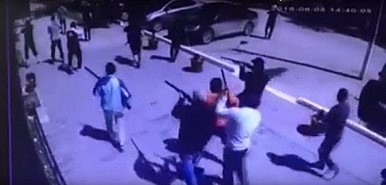
Terrorist Attacks in West Kazakhstan Call for Urgent Reforms
Publication: Eurasia Daily Monitor Volume: 13 Issue: 111
By:

Kazakhstan has traditionally been considered the most stable and prosperous country of Central Asia and was even dubbed by external observers an “island of stability” in a chronically volatile region. Yet, on June 5, this image was shattered when a group of more than 20 young men attacked several targets in the western city of Aktobe. First of all, they overran a gun store in the city center by killing the owner, wounding one security guard and three police officers, who arrived on the premises minutes later. With some 17 stolen guns, including rifles and pistols, they separated into two groups. The first group hijacked a police vehicle and attacked a second gun store hundreds of meters away. One visitor was killed, but a nearby police patrol managed to shoot three of the assailants and to capture another one after an intense exchange of fire. The others quickly escaped the scene (Tengrinews.kz, Inform.kz, Kursiv.kz, 365info.kz, June 5).
As to the second group of terrorists, they hijacked a city bus, forced all passengers to hurriedly disembark, and ordered the driver to ram the gate of a local military base. The facility is operated by the National Guard of Kazakhstan, established by presidential decree in April 2014 and entrusted with ensuring public safety and security against possible terrorist or extremist threats. The ensuing skirmishes left three military personnel dead and six more wounded, which came as a surprise given the elite status of the base and the heavy protection it enjoyed. Luckily for the authorities, the attackers failed to seize any weapons from an arms depot and had to retreat after being repelled by incoming forces. One of the attackers was shot dead and another injured in this attempt (Vlast.kz, Tengrinews.kz, June 6; Kapital.kz, June 5).
The following day, on June 6, Interior Minister Kalmukhanbet Kassymov publicly admitted that this had been an “act of terror.” Following Prime Minister Karim Massimov’s remarks that the situation was “under control,” President Nursultan Nazarbayev announced a large-scale antiterrorist operation. He further declared a curfew in Aktobe and increased the level of terrorist threat throughout the country from “neutral” to “yellow” for 40 days. That implies that Kazakhstani security forces are now authorized by law to search individuals and homes and to arrest suspicious persons with potential ties to extremists. The antiterrorist operation ended on June 10, after all the attackers of the previous week had been killed or captured. In total, 7 innocent lives were lost, in addition to 18 extremists (out of 25 officially identified by the authorities); overall, 22 were wounded (Nur.kz, Radiotochka.kz, June 10; Newskaz.ru, June 7; Forbes.kz, June 6).
The last time Kazakhstan was under attack from presumed extremists was in 2011 and 2012, when improvised explosive devices went off in Astana, Aktobe (both in May 2011) and Atyrau (October 2011 and September 2012). Moreover, shootouts occurred between heavily armed extremists and the police in the southern city of Taraz in November 2011, and Almaty Oblast in August 2012. Yet, none of those incidents were so well organized, planned or executed. Kazakhstan’s Ministry of Interior and the National Security Committee have so far speculated that the attacks might have been inspired by Salafism, a radical Islamist ideology with thousands of supporters across Central Asia. Investigators have reportedly established a link to a radical imam in Syria who reportedly spoke by videoconference with the attackers and encouraged them to commit crimes (Informburo.kz, Zakon.kz, June 10).
While Kazakhstan has long been resistant to Islamism thanks to a vibrant economy and generous government subsidies, the ongoing economic crisis is a hard test for domestic stability. Last year, Kazakhstan’s GDP grew by some 1.2 percent, after 6 percent growth in 2013 and 4.3 percent in 2015. The drastic reduction in the price of oil—the country’s main export commodity, which accounts for 60 percent of government revenue and around a quarter of its GDP—has been the main cause of concern. With the economy in near recession, Kazakhstani authorities are more than ever confronted with the recognition of the need for structural reforms. Otherwise, economic hardships might push a growing number of disenfranchised Kazakhs toward radicalization, building on the years of propaganda work by various extremist movements, most recently by the Islamic State (Khabar.kz, June 8; Nomad.su, April 26; 24.kz, February 15).
However, the Islamic State factor is not the only issue that underscores the need for quick but effective political and economic reforms in Kazakhstan. President Nazarbayev—in office since 1991, after serving as head of Soviet Kazakhstan since 1986—will turn 76 on July 4. And he has yet to designate a successor or pave the way for a smooth transition. The strong presidential system he has built over the years may actually turn out to be extremely fragile if, during a crisis, all decision-making lies with one person. The predicament is further compounded by the necessity to maintain a delicate balance between two powerful neighbors, Russia and China, especially given Kazakhstan’s membership in the Moscow-dominated Eurasian Economic Union (EEU) and Russia’s diplomatic standoff with the West. To stay the course, this difficult and multifaceted situation will require a great deal of leadership and perspicacity from Kazakhstan’s officials.



